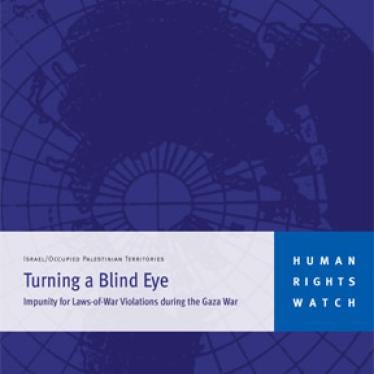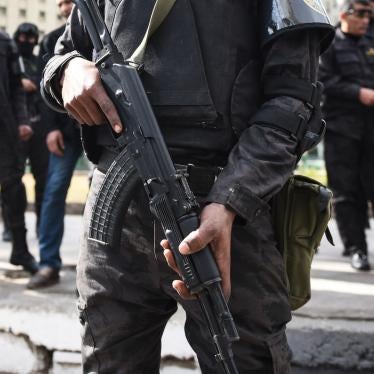(Jerusalem) - Israel's investigations into serious laws-of-war violations by its forces during last year's Gaza war lack thoroughness and credibility, while Hamas has conducted no credible investigations at all, Human Rights Watch said in a report released today. Independent investigations are needed in both Israel and Gaza to hold perpetrators accountable and provide civilian victims with redress, Human Rights Watch said.
The 62-page report, "Turning a Blind Eye: Impunity for Laws-of-War Violations during the Gaza War," details the steps both Israel and Hamas have taken over the past year to investigate alleged violations of the laws of war and possible war crimes, and how those investigations have fallen far short of international legal standards.
"Israel's investigations have not met international standards, and Hamas has conducted no serious investigations at all," said Sarah Leah Whitson, Middle East director at Human Rights Watch. "On both sides, civilian victims are waiting for justice and redress."
The report calls on influential governments and international bodies to renew their pressure on Israel and Hamas to conduct investigations that are prompt, thorough and impartial. Allowing violations to go unpunished will hamper efforts to resolve the Israeli-Palestinian conflict and undermine international justice efforts elsewhere, Human Rights Watch said.
The failure of Israel and Hamas to conduct impartial investigations is defying calls for accountability from an ever-growing list of governments, the United Nations secretary-general, the UN General Assembly and the European Parliament.
In February 2010, the UN General Assembly called for the second time on both parties to conduct thorough and impartial investigations, setting a deadline of July. A majority of European Union member states supported the resolution, including permanent Security Council members France and the United Kingdom.
"Turning a Blind Eye" documents in detail the measures taken by Israel and Hamas to investigate the many credible allegations of laws-of-war violations documented by Human Rights Watch, the UN Fact-Finding Mission on the Gaza Conflict, and others.
In Gaza, Hamas has punished no one for ordering or carrying out hundreds of deliberate or indiscriminate rocket attacks into Israeli cities and towns, which killed three Israeli civilians during the war and wounded dozens more.
Hamas claims it launched rockets only at military targets and that civilian casualties were unintended. That claim ignores the fact that rockets fired into Israel that did not land in open terrain mostly hit civilian populated areas, including towns and cities, far from any military target, Human Rights Watch said.
In addition, the locally made Qassam and longer-range Grad rockets launched from Gaza have no guidance systems and are invariably indiscriminate when fired into densely populated areas. Statements by Hamas leaders prior to and during last year's fighting strongly suggest that harming civilians was a goal of the attacks, rather than an accidental result.
Cases of killings and torture by Hamas security forces against suspected collaborators and political rivals in Gaza have also gone unpunished, Human Rights Watch said.
Israel has taken some steps to investigate alleged war crimes during its three-week "Operation Cast Lead" in Gaza, but these fall far short of being thorough and impartial, Human Rights Watch said.
Between December 27, 2008 and January 18, 2009, Israeli forces killed several hundred Palestinian civilians and wounded many more, some during attacks that were indiscriminate, disproportionate or, in some cases, seemingly deliberate - all serious violations of the laws of war. Israeli forces also extensively destroyed civilian objects in Gaza without a lawful military reason, including homes, agricultural land and factories.
The Israeli government says it has investigated roughly 150 incidents in Gaza, but approximately 120 of these were limited to the military's internal "operational debriefings," which consider testimony from the soldiers involved but not from witnesses or victims. Thirty-six incidents are or have been the subject of a criminal investigation, but the military has neglected many incidents deserving investigation.
Israel also has not credibly investigated the policies authorized by senior political and military leaders that may have led to laws-of-war violations, Human Rights Watch said. These include policies on the targeting of Hamas political institutions and Gaza police who were not participating in the hostilities; the use of heavy artillery and white phosphorus munitions in populated areas; and the rules of engagement for aerial drone operators and ground forces.
All Israeli debriefings and investigations have been conducted by the military itself, and the government has rejected calls for an independent review.
To date, Israeli military authorities have convicted only one soldier for crimes committed in Gaza - for stealing a credit card from a Palestinian. Two more soldiers are on trial for ordering a Palestinian boy to open bags that they suspected were rigged with explosives.
Human Rights Watch called on the United States and European governments to demand that Israel conduct impartial investigations into alleged laws-of-war violations and into policies set by senior officials that may have led to violations.
"US officials have praised Israel's military justice system without acknowledging how it has failed to serve many Palestinian victims of the Gaza war," Whitson said.
Governments with influence on Hamas and bodies such as the Arab League and the Organisation of the Islamic Conference should demand credible investigations by the authorities in Gaza, Human Rights Watch said. To date, none of Hamas's supporters have called for accountability or pressed for serious investigations.
Human Rights Watch said that continued impunity for serious violations during the Gaza war will harm efforts to achieve a durable peace. In addition, governments that tolerate impunity in the Israeli-Palestinian conflict weaken their calls for accountability in other conflicts, such as in Sri Lanka, Sudan, and the Democratic Republic of Congo.
Ultimately, if domestic investigations in Israel and Gaza fail to deliver justice for the victims of laws-of-war violations, then international prosecutions are required, Human Rights Watch said.






